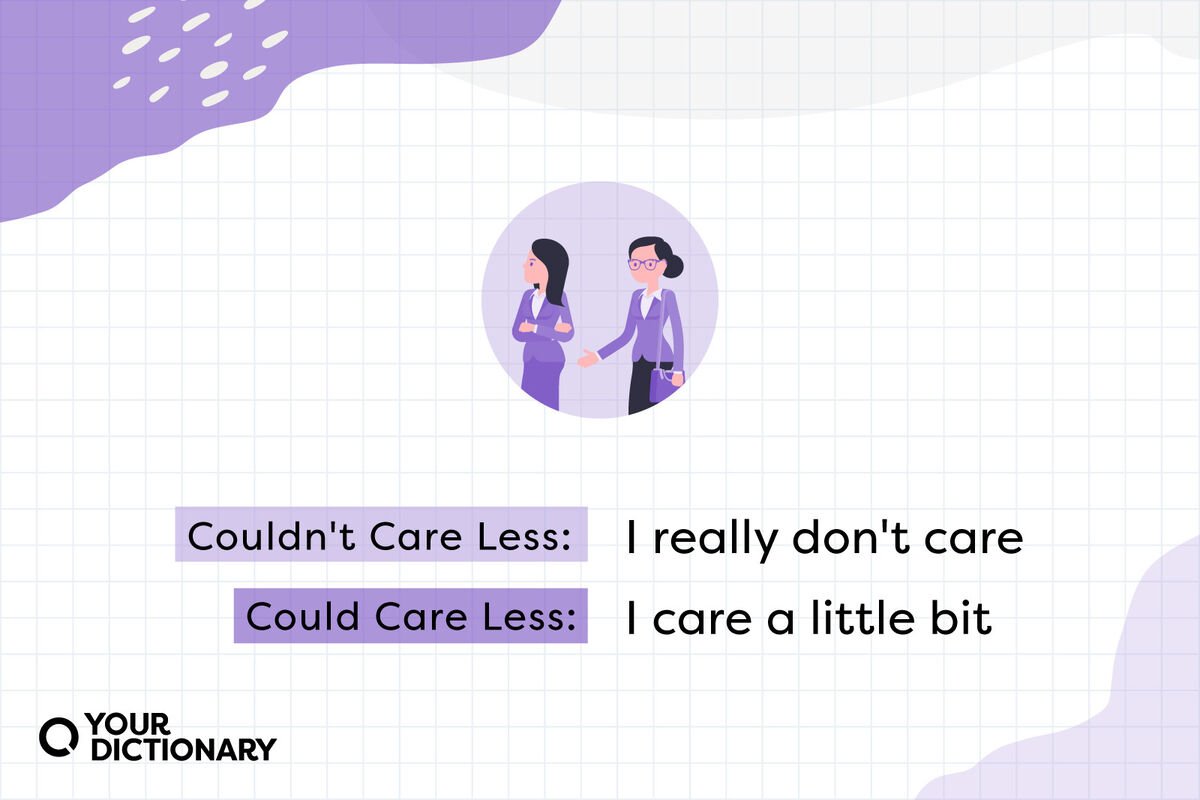
“I could care less about what Scott thinks,” you say, tossing your hair nonchalantly. Your friends nod in agreement — everyone except your grammar nerd friend who is secretly thinking “So you do actually care what Scott thinks.” Did you commit the common grammar sin of mixing up “could care less” and “couldn’t care less,” or did you accidentally reveal what you truly believe?
Couldn’t Care Less: I Really Don’t Care
When you say “I couldn’t care less about what Scott thinks,” you’re saying you absolutely, positively do not care about Scott’s opinion. You couldn’t care less because you already care the minimum amount, which is zero. The same goes for could not without the contraction (and a more pointed emphasis).
For example:
-
Marcy couldn’t care less about who her ex is dating now. (She doesn’t care at all.)
-
We couldn’t care less about what grade you get in Algebra. (We don’t care at all.)
-
The boys could not care less about waking up the neighbors. (They don’t care at all.)
Could Care Less: I Care a Little Bit
However, if you say “I could care less,” you’re indicating that you do care a tiny bit (or even more) because if you can care less, it’s not zero amount of caring. For example:
-
Marcy could care less about who her ex is dating now. (She’s a little curious about who he’s dating.)
-
We could care less about what grade you get in Algebra. (We care a little bit about your Algebra grade).
-
The boys could care less about waking up the neighbors. (They’re a little worried about waking up the neighbors.)
Does It Even Matter?
The phrase “could care less” is a lot more common than “couldn’t care less,” so how important could the difference really be? Quite important — depending on who you’re talking to.
If you’re with friends and you’re confident none of them are grammar sticklers, they’ll understand that you mean “I don’t care” when saying “I could care less.” However, if you’re writing a formal paper or email, you should get it right. A few tips to remember the difference include:
-
Both “couldn’t care less” and “don’t care” are negative words. When you say “I couldn’t care less,” you’re saying “I don’t care.”
-
Substitute less for its antonym more. “I couldn’t care more about this” means that it’s very important to you, making the phrase “I couldn’t care less” its exact opposite. However, if you say “I could care more about this,” you’re saying you don’t care very much — which expresses the same sentiment as “I could care less.”
-
Think of being handed an empty plate in a restaurant. Could you eat less than is on that plate? No, because there’s nothing there. You can only eat more.
Other Ways to Express Apathy
There’s an easy way to avoid all this confusion — just rewrite the sentence. Go beyond “I don’t care” with great words and phrases like:
-
I’m apathetic
-
I’m dispassionate
-
I’m impartial
-
I’m incurious
-
I’m indifferent
-
I’m disinclined to engage
-
I’m uninterested
-
I’m pococurante
You Could Care a Lot Less About Grammar
Believe it or not, some people couldn’t care less about grammar rules (we were shocked too), but you don’t have to be one of them. Master tricky turns-of-phrase with: